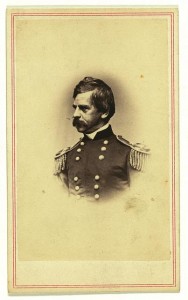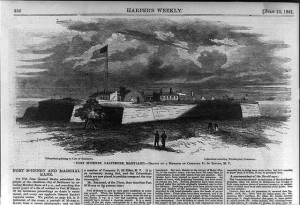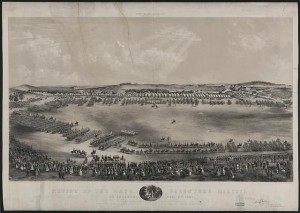From the June 12, 1861 edition of The New-York Times:
GEN. BANKS AT BALTIMORE.
BALTIMORE, Monday, June 10.
Maj. Gen. BANK was at Fort McHenry this afternoon. He assumes command of this military district to-morrow, making the fort his head-quarters.
Gen. CADWALLADER leaves to assume important duties southward.
Gen. BANKS will cordially cooperate with the civil authorities for the preservation of order. Columbiads and 42-pounders are being brought to bear on the city from Fort McHenry. The populace are irritated by the presence of Northern troops, but the conciliatory programme enunciated by Gen. BANKS removed all apprehensions.
Gen. BANKS indorses the recommendation for an appropriation of seven hundred and fifty millions of dollars for the prosecution of the war.
Also from the same issue of The Times:
AIDING THE ENEMY.
The Albany Atlas and Argus is one of the few Northern journals which from force of habit cannot elevate itself above partisan association. Its issue of yesterday contains a characteristic attack upon Gov. BANKS, based upon the oft-refuted falsehood, that he on one occasion declared his willingness to “let the Union slide.” While Gov. BANKS has always been a steadfast friend of the Union, as a civilian and a statesman, and while he will be as a General in the field, the Atlas and Argus must not forget that itself was an influential ally of the Southern conspirators, and only disowned their service when the masses of the Democratic Party compelled it, most reluctantly, to wheel into the patriot ranks
Nathaniel P. Banks was a political general:
As the Civil War became imminent, President Abraham Lincoln considered Banks for a cabinet post, and eventually chose him as one of the first major generals of volunteers, appointing him on May 16, 1861. Perceptions that the Massachusetts militia was well organized and armed at the beginning of the Civil War likely played a role in the appointment decision, as Banks had also been considered for quartermaster general. He was initially resented by many of the generals who had graduated from the United States Military Academy, but Banks brought political benefits to the administration, including the ability to attract recruits and money for the Federal cause.





Pingback: Papers, Rock, Scissored | Blue Gray Review